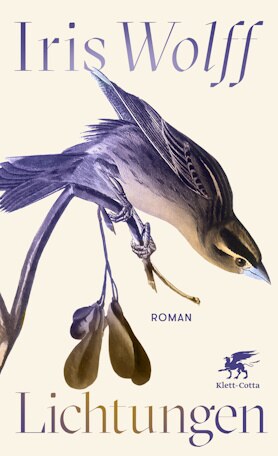Fiction
Iris Wolff
Lichtungen
[Glimmer of Light]
Translation Grant Programme
Italian rights already sold.
On Going and Staying
“Europe in miniature” is a label sometimes given to the Romanian regions of Transylvania and the Banat on account of the diversity of ethnic and linguistic groups that have traditionally made their home there. It was in these regions that Iris Wolff, born in 1977 in the town of Sibiu (also known as Hermannstadt), spent her childhood before coming to Germany at the age of eight. Today she lives and works as a writer in Freiburg im Breisgau, and each of her five, multiple-award-winning novels to date preserves something of this early influence along with the events and stories she encountered in her Romanian-German family. In compelling yet effortless prose, which she herself sees as “close to poetry,” she takes this material and transcends the bounds of her own family history, transforming it into quintessential human experience.
Wolff’s most recent novel “Glimmer of Light” is well on its way to becoming a bestseller, just like her previous effort “The Blurriness of the World” (2020). The new book draws on similar themes, but instead of following multiple strands and characters focuses on the portrayal of an unusual love affair. The novel’s two protagonists, Lev and Kato, grow up under the Ceauşescu dictatorship in a village in northern Romania on the border with Transylvania. Both are from mixed-ethnic and broken families and even as children were sensitive outsiders. Suffering from the loss of his father at a young age, eleven-year-old Lev is psychosomatically paralyzed and bedridden for months following a traumatic incident. His classmate Kato, a bright young girl whom everyone shuns (her Roma origins are alluded to), brings him his daily homework assignments. An indestructible friendship develops between them, leading to a timid love affair.
And yet the profoundly different natures of these two young individuals set them on divergent paths in life. When the borders finally open, enabling a new beginning, plucky and rebellious Kato leaves the country, making her living as a street painter in Western Europe. Phlegmatic and introverted Lev, on the other hand, chooses to stay behind and yearns for a sense of belonging and rootedness. He eventually becomes a logger, gaining a profound understanding of the nature and geography of his homeland, whereas the people he encounters remain a mystery to him. He only sees Kato during her sporadic visits. Until one day a postcard from Zurich arrives, beckoning him to finally leave everything behind.
This is the starting point of Iris Wolff’s novel, whose plot develops in reverse chronology, from the ninth to the first chapter. With the help of this literary device she takes us, from Lev’s perspective, on a journey through time that spans four decades, before and after the revolution of 1989, rewinding from Lev’s adulthood to his youth and early years, from the postcommunist era to the years of dictatorship. The changes and disruptions that take place along the way are illuminated by memory, not in a systematic way but by highlighting individual scenes, through depictions of landscapes, people and events, leaving much in the dark or hanging in the balance.
At one point the process is explained, and with it the title of this touching novel about going and staying, intimacy and estrangement, stagnation and movement: “Memories were scattered through time like clearings in the forest, like glimmers of light; you encountered them by chance and never knew what you would find in them.” Wolff‘s language, too, is shot through with light, extremely sensuous images alternating in an organic flow with contemplative passages. The individual chapters, opening with quotes from fairy tales, poems, songs and other traditional forms in different languages, are open-ended. The same goes for the first chapter, in which the reader doesn’t learn if Kato and Lev arrive anywhere, together or separately. But what did Lev’s grandfather say, who fled the dictatorship into freedom early on? “Once you’ve picked up and left, you’re always on the move.”
Translated by David Burnett
By Kristina Maidt-Zinke
Kristina Maidt-Zinke is a book and music critic at the Süddeutsche Zeitung and also writes reviews for Die Zeit.


